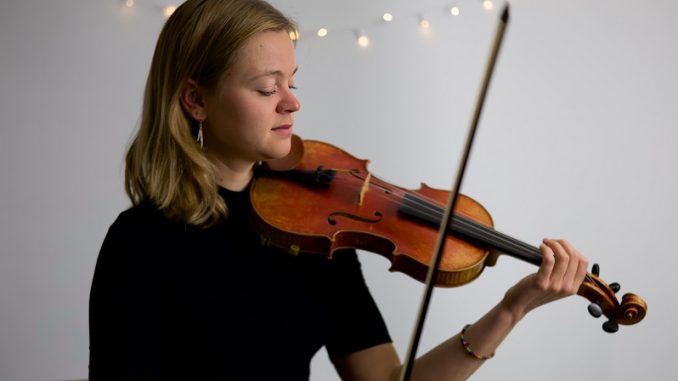
Another set of folk music albums for our short review format Folk Roundup column – and this time we can finally say that the Welsh Folk album has arrived. Strangely this is probably a first for Americana UK, but hopefully will be far from the last. For some reason that it is hard to fathom Welsh Language Folk seems to be the poor relation when it comes to the UK – “Celtic” folk (if you like) in the form of music from Scotland and Ireland is an incredibly strong presence and despite all those bizarre people who think that “it’s not allowed to celebrate anything English, they won’t let you” in fact the English folk scene is as strong as ever – Eliza Carthy anyone? Sam Lee? Bellowhead (now reformed!), Angeline Morrison, Shirley Collins….voices old and new. These are all musics that went out into the world – and to Canada and the USA in particular when we think about the folk roots of Americana and so it’s perfectly right and proper to shine a light on a collection of what’s new in the scene.
There’s definitely a very traditional feel to this roundup, and a lot of fiddles. That’s no bad thing as the music that the combination of those two statements can lead to is about as varied as can be imagined. There’s also a mini-theme of “live means live“, and if any music benefits from being captured live then that is surely folk (whatever that is!).
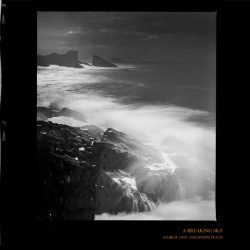 Charlie Grey and Joseph Peach have produced for their fifth release an album of improvised fiddle and piano very much anchored to a particular place: ‘A Breaking Sky‘ was recorded live over a week’s residency at Ardkinglas House on the shores of Loch Fyne. It’s an elegant collaboration, with a dark and brooding feel which embodies a bleak and haunted psychogeographic landscape on tunes such as ‘Ghlinne Garry’ and ‘Losgadh Chaisteal Tioram’. One would not be surprised to learn that the recording was made during a perpetual overcast, broken by squalls of rain. Even ‘Oidhche Challain‘ (‘New Year’ in the English) has a sepulchral tone – this is very much a commemoration of the death of a year rather than a joyous embracing of the yet unwritten future. Throughout ‘A Breaking Sky‘ the music is as impressive in its restraint as it is somber. (7/10)
Charlie Grey and Joseph Peach have produced for their fifth release an album of improvised fiddle and piano very much anchored to a particular place: ‘A Breaking Sky‘ was recorded live over a week’s residency at Ardkinglas House on the shores of Loch Fyne. It’s an elegant collaboration, with a dark and brooding feel which embodies a bleak and haunted psychogeographic landscape on tunes such as ‘Ghlinne Garry’ and ‘Losgadh Chaisteal Tioram’. One would not be surprised to learn that the recording was made during a perpetual overcast, broken by squalls of rain. Even ‘Oidhche Challain‘ (‘New Year’ in the English) has a sepulchral tone – this is very much a commemoration of the death of a year rather than a joyous embracing of the yet unwritten future. Throughout ‘A Breaking Sky‘ the music is as impressive in its restraint as it is somber. (7/10)
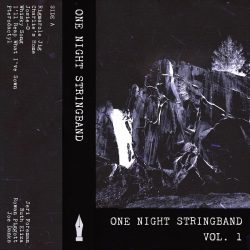 ‘One Night String Band‘ is the result of a mutual admiration society between a pair of old-time fiddle and banjo duos from the North of England and Scotland – namely Old Spot and Jeri Foreman & Ruth Eliza. They’d contrived to modify their schedules to, instead of criss-crossing each others’ paths actually play the same venues at the same time. It sounded like a cool idea, and also gave the pair of pairs a chance to have a backstage jam – and fortunately they hit record at some point and turned it into a recording session. The resultant mini-album ‘One Night String Band‘ captures banjos, fiddles and vocals in a really vibrant way, that playing live and sparking off each other feel was wonderfully transferred. They may have had to stay up to 3AM, they may have had to consume a lot of whiskey, but that dedication was well worth it. A glorious listen. (8/10)
‘One Night String Band‘ is the result of a mutual admiration society between a pair of old-time fiddle and banjo duos from the North of England and Scotland – namely Old Spot and Jeri Foreman & Ruth Eliza. They’d contrived to modify their schedules to, instead of criss-crossing each others’ paths actually play the same venues at the same time. It sounded like a cool idea, and also gave the pair of pairs a chance to have a backstage jam – and fortunately they hit record at some point and turned it into a recording session. The resultant mini-album ‘One Night String Band‘ captures banjos, fiddles and vocals in a really vibrant way, that playing live and sparking off each other feel was wonderfully transferred. They may have had to stay up to 3AM, they may have had to consume a lot of whiskey, but that dedication was well worth it. A glorious listen. (8/10)
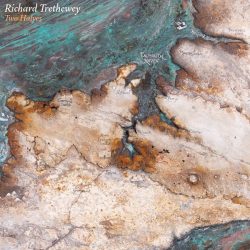 ‘Two Halves‘ is the latest album from Cornish singer and fiddle and cittern player Richard Tretheway and was conceived as a vinyl project, with one side of songs touching on Cornish history – with songs in particular of smuggling – and a side of songs drawing more directly on his family history in the County. ‘Frenchman’s Creek‘ has a military air about it, with the drumming of the militia echoing in the ears of the smugglers waiting for an opportune moment to sail for France. ‘Queen of thr Cornish Rhine‘ humerously tells the tale of a proud Cornishman who wished to celebrate a naval visit by Queen Victoria but whose cannon salute came a bit close to inflicting injury instead. ‘Tretheway Mine‘ shows off Richard’s cittern playing as he sings of a letter home from Canada encouraging family members to emigrate and help mine a bountiful silver ore, whilst ‘The Sounds of the Mine‘ offers a more realistic representation of the perils of a life underground. It’s an album of good, solid, narrative folk storytelling. (6/10).
‘Two Halves‘ is the latest album from Cornish singer and fiddle and cittern player Richard Tretheway and was conceived as a vinyl project, with one side of songs touching on Cornish history – with songs in particular of smuggling – and a side of songs drawing more directly on his family history in the County. ‘Frenchman’s Creek‘ has a military air about it, with the drumming of the militia echoing in the ears of the smugglers waiting for an opportune moment to sail for France. ‘Queen of thr Cornish Rhine‘ humerously tells the tale of a proud Cornishman who wished to celebrate a naval visit by Queen Victoria but whose cannon salute came a bit close to inflicting injury instead. ‘Tretheway Mine‘ shows off Richard’s cittern playing as he sings of a letter home from Canada encouraging family members to emigrate and help mine a bountiful silver ore, whilst ‘The Sounds of the Mine‘ offers a more realistic representation of the perils of a life underground. It’s an album of good, solid, narrative folk storytelling. (6/10).
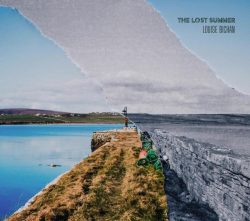 Louise Bichan is a talented fiddle player, who took the instrument up at the age of seven in her native Orkney Islands. She has since relocated to the USA, and furthered her craft after winning a scholarship to Berklee College of Music in Boston. ‘The Lost Summer‘ is her second album, recently released on Adhyaropa Records and follows up on her release of eight years ago ‘Out Of My Own Light’. Whilst it clearly draws on Scottish tradition there are a plethora of other influences coming to play as on the jazzy ‘Pinnacle‘. A noteworthy inclusion is ‘Rhena’s 80th‘ which was written for “the greatest of great aunts” and surely represents a far from sedate celebration. It is also noteworthy as being (she thinks) Louise Bichan’s first ever composition – you’d never guess it from the lively tune. (7/10)
Louise Bichan is a talented fiddle player, who took the instrument up at the age of seven in her native Orkney Islands. She has since relocated to the USA, and furthered her craft after winning a scholarship to Berklee College of Music in Boston. ‘The Lost Summer‘ is her second album, recently released on Adhyaropa Records and follows up on her release of eight years ago ‘Out Of My Own Light’. Whilst it clearly draws on Scottish tradition there are a plethora of other influences coming to play as on the jazzy ‘Pinnacle‘. A noteworthy inclusion is ‘Rhena’s 80th‘ which was written for “the greatest of great aunts” and surely represents a far from sedate celebration. It is also noteworthy as being (she thinks) Louise Bichan’s first ever composition – you’d never guess it from the lively tune. (7/10)
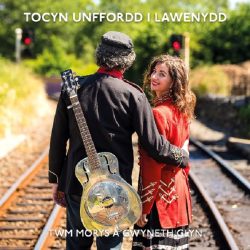 Twm Morys and Gwyneth Glyn have produced the album ‘Tocyn unffordd i lawenydd’ which is an album of new folk songs very much in the Folk Revival tradition. It’s a very familiar sound – guitar and harmonica, the gruffer voiced Twm Morys balanced out by the sweeter vocals of Gwenyeth Glyn. You don’t have to be a Welsh speaker to know that the title song is a train inspired metaphor – it translates as ‘One Way Ticket To Joy‘ and it powers along nicely. The singing of “Dulce et decorum est” on ‘Rhyfel Hedd Wyn‘ only serves to confirm that it’s an anti-war song, as is ‘Jini‘ which borrows from ‘Keep the Home Fires Burning.‘ If there is one strange thing, though, when listening to an album in a language one does not speak it is to hear not once, but twice, the name Lauren Bacall – and in different songs. An icon of course. ‘Tocyn unffordd i lawenydd’ is an album that will bring to mind nights in the local folk club with a more than capable featured artist. (6/10)
Twm Morys and Gwyneth Glyn have produced the album ‘Tocyn unffordd i lawenydd’ which is an album of new folk songs very much in the Folk Revival tradition. It’s a very familiar sound – guitar and harmonica, the gruffer voiced Twm Morys balanced out by the sweeter vocals of Gwenyeth Glyn. You don’t have to be a Welsh speaker to know that the title song is a train inspired metaphor – it translates as ‘One Way Ticket To Joy‘ and it powers along nicely. The singing of “Dulce et decorum est” on ‘Rhyfel Hedd Wyn‘ only serves to confirm that it’s an anti-war song, as is ‘Jini‘ which borrows from ‘Keep the Home Fires Burning.‘ If there is one strange thing, though, when listening to an album in a language one does not speak it is to hear not once, but twice, the name Lauren Bacall – and in different songs. An icon of course. ‘Tocyn unffordd i lawenydd’ is an album that will bring to mind nights in the local folk club with a more than capable featured artist. (6/10)
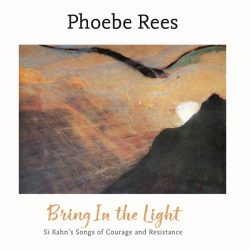 Phoebe Rees’ ‘Bring In the Light: Si Kahn’s Songs of Courage and Resistance’ is somewhat self-explanatory – the multi-instrumentalist and singer was asked to make her debut full length album a carrying forward of the songs of the activist and musician Si Kahn – and it was released to coincide with his 80th birthday. Kahn clearly recognised in her a kindred spirit – the Welsh born Rees has worked in a community arts project in Sao Paulo, and as a volunteer choir leader for a children’s choir project in Mumbai and her musical accomplishments are matched by a passionate commitment to social justice. There’s no surprise that the songs do veer towards the political, and in particular songs of civil rights, crossing a wide spectrum from war in Afghanistan to thoughts of a United Ireland. A tense and dramatic rendition of ‘Mississipi Summer‘ offers a nice contrast to the June tabor & The Oysterband take on the same song. ‘Freedom is a Constant‘ which draws through civil rights protests of the 1960s to similar protests fifty years later – and rather than sinking into a nothing changes despair the song declares “they hearten and encourage me / Late this evening I can hear through my window high above / Young marchers sinbging back the fear against the chill of a dream gone wrong.” (7/10)
Phoebe Rees’ ‘Bring In the Light: Si Kahn’s Songs of Courage and Resistance’ is somewhat self-explanatory – the multi-instrumentalist and singer was asked to make her debut full length album a carrying forward of the songs of the activist and musician Si Kahn – and it was released to coincide with his 80th birthday. Kahn clearly recognised in her a kindred spirit – the Welsh born Rees has worked in a community arts project in Sao Paulo, and as a volunteer choir leader for a children’s choir project in Mumbai and her musical accomplishments are matched by a passionate commitment to social justice. There’s no surprise that the songs do veer towards the political, and in particular songs of civil rights, crossing a wide spectrum from war in Afghanistan to thoughts of a United Ireland. A tense and dramatic rendition of ‘Mississipi Summer‘ offers a nice contrast to the June tabor & The Oysterband take on the same song. ‘Freedom is a Constant‘ which draws through civil rights protests of the 1960s to similar protests fifty years later – and rather than sinking into a nothing changes despair the song declares “they hearten and encourage me / Late this evening I can hear through my window high above / Young marchers sinbging back the fear against the chill of a dream gone wrong.” (7/10)


